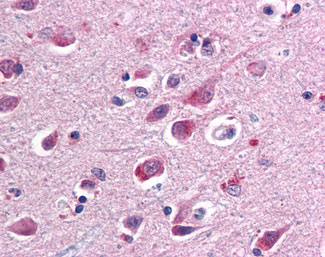SARM1 / SARM Antibody (clone Sarmy-1)
Mouse Monoclonal Antibody
- SPECIFICATION
- CITATIONS
- PROTOCOLS
- BACKGROUND

Application
| IHC-P, IP |
|---|---|
| Primary Accession | Q6SZW1 |
| Reactivity | Human |
| Host | Mouse |
| Clonality | Monoclonal |
| Clone Names | Sarmy-1 |
| Calculated MW | 79kDa |
| Dilution | IHC-P (10 µg/ml), IP (1:200), |
| Gene ID | 23098 |
|---|---|
| Other Names | Sterile alpha and TIR motif-containing protein 1, Sterile alpha and Armadillo repeat protein, Sterile alpha motif domain-containing protein 2, MyD88-5, SAM domain-containing protein 2, Tir-1 homolog, SARM1, KIAA0524, SAMD2, SARM |
| Target/Specificity | Recognizes human SARM. |
| Reconstitution & Storage | Long term: -70°C; Short term: +4°C |
| Precautions | SARM1 / SARM Antibody (clone Sarmy-1) is for research use only and not for use in diagnostic or therapeutic procedures. |
| Name | SARM1 |
|---|---|
| Function | NAD(+) hydrolase, which plays a key role in axonal degeneration following injury by regulating NAD(+) metabolism (PubMed:25908823, PubMed:27671644, PubMed:28334607). Acts as a negative regulator of MYD88- and TRIF-dependent toll-like receptor signaling pathway by promoting Wallerian degeneration, an injury-induced form of programmed subcellular death which involves degeneration of an axon distal to the injury site (PubMed:15123841, PubMed:16964262, PubMed:20306472, PubMed:25908823). Wallerian degeneration is triggered by NAD(+) depletion: in response to injury, SARM1 is activated and catalyzes cleavage of NAD(+) into ADP-D-ribose (ADPR), cyclic ADPR (cADPR) and nicotinamide; NAD(+) cleavage promoting cytoskeletal degradation and axon destruction (PubMed:25908823, PubMed:28334607, PubMed:30333228, PubMed:31128467, PubMed:31439792, PubMed:31439793, PubMed:32049506, PubMed:32828421, PubMed:33053563). Also able to hydrolyze NADP(+), but not other NAD(+)-related molecules (PubMed:29395922). Can activate neuronal cell death in response to stress (PubMed:20306472). Regulates dendritic arborization through the MAPK4-JNK pathway (By similarity). Involved in innate immune response: inhibits both TICAM1/TRIF- and MYD88-dependent activation of JUN/AP-1, TRIF-dependent activation of NF-kappa-B and IRF3, and the phosphorylation of MAPK14/p38 (PubMed:16964262). |
| Cellular Location | Cytoplasm. Cell projection, axon {ECO:0000250|UniProtKB:Q6PDS3}. Cell projection, dendrite {ECO:0000250|UniProtKB:Q6PDS3}. Synapse {ECO:0000250|UniProtKB:Q6PDS3}. Mitochondrion Note=Associated with microtubules. {ECO:0000250|UniProtKB:Q6PDS3} |
| Tissue Location | Predominantly expressed in brain, kidney and liver. Expressed at lower level in placenta. |

Thousands of laboratories across the world have published research that depended on the performance of antibodies from Abcepta to advance their research. Check out links to articles that cite our products in major peer-reviewed journals, organized by research category.
info@abcepta.com, and receive a free "I Love Antibodies" mug.
Provided below are standard protocols that you may find useful for product applications.
Background
Negative regulator of MYD88- and TRIF-dependent toll- like receptor signaling pathway which plays a pivotal role in activating axonal degeneration following injury. Promotes Wallerian degeneration an injury-induced axonal death pathway which involves degeneration of an axon distal to the injury site. Can activate neuronal death in response to stress. Regulates dendritic arborization through the MAPK4-JNK pathway. Involved in innate immune response. Inhibits both TICAM1/TRIF- and MYD88- dependent activation of JUN/AP-1, TRIF-dependent activation of NF- kappa-B and IRF3, and the phosphorylation of MAPK14/p38.
References
Mink M.,et al.Genomics 74:234-244(2001).
Bousson J.-C.,et al.Submitted (OCT-2003) to the EMBL/GenBank/DDBJ databases.
Nagase T.,et al.DNA Res. 5:31-39(1998).
Liberati N.T.,et al.Proc. Natl. Acad. Sci. U.S.A. 101:6593-6598(2004).
Carty M.,et al.Nat. Immunol. 7:1074-1081(2006).
If you have used an Abcepta product and would like to share how it has performed, please click on the "Submit Review" button and provide the requested information. Our staff will examine and post your review and contact you if needed.
If you have any additional inquiries please email technical services at tech@abcepta.com.













 Foundational characteristics of cancer include proliferation, angiogenesis, migration, evasion of apoptosis, and cellular immortality. Find key markers for these cellular processes and antibodies to detect them.
Foundational characteristics of cancer include proliferation, angiogenesis, migration, evasion of apoptosis, and cellular immortality. Find key markers for these cellular processes and antibodies to detect them. The SUMOplot™ Analysis Program predicts and scores sumoylation sites in your protein. SUMOylation is a post-translational modification involved in various cellular processes, such as nuclear-cytosolic transport, transcriptional regulation, apoptosis, protein stability, response to stress, and progression through the cell cycle.
The SUMOplot™ Analysis Program predicts and scores sumoylation sites in your protein. SUMOylation is a post-translational modification involved in various cellular processes, such as nuclear-cytosolic transport, transcriptional regulation, apoptosis, protein stability, response to stress, and progression through the cell cycle. The Autophagy Receptor Motif Plotter predicts and scores autophagy receptor binding sites in your protein. Identifying proteins connected to this pathway is critical to understanding the role of autophagy in physiological as well as pathological processes such as development, differentiation, neurodegenerative diseases, stress, infection, and cancer.
The Autophagy Receptor Motif Plotter predicts and scores autophagy receptor binding sites in your protein. Identifying proteins connected to this pathway is critical to understanding the role of autophagy in physiological as well as pathological processes such as development, differentiation, neurodegenerative diseases, stress, infection, and cancer.


